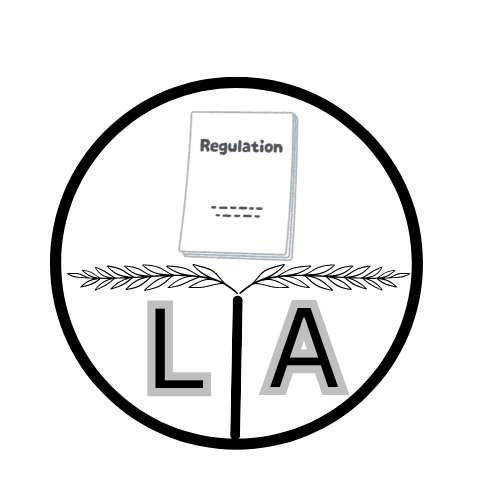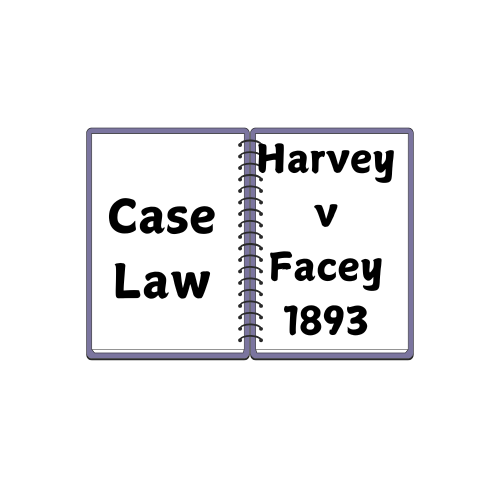Harvey v. Facey Case summary
Harvey v. Facey Case summary
Welcome to Law Adhoc Tutorials !
Law Adhoc Tutorials is an education platform. It helps law students get high quality notes to make their study easier. Law Adhoc Tutorials provides full and completes notes for free for each subjects of law.
Harvey v. Facey Case summary
Important Landmark Case Laws :
https://lawadhoctutorials.com/rylands-v-fletcher-case-summary/
Topic related to this case : https://lawadhoctutorials.com/proposal-offer-in-indian-contract-act/
YouTube video Lecture : https://youtu.be/fRx-i5fk3jo?si=KA7LBLL_oXFh84yA
Legal maxims : https://lawadhoctutorials.com/legal-maxims/
Harvey v. Facey Case summary
From The Supreme Court Of Judicature Of Jamaica
Citation: (1893) AC 552
Delivered On: 29th July 1893
Bench: The Lord Chancellor, Lord Watson, Lord Hobhouse, Lord Macnaghten, Lord Morris, Lord Shand. [Delivered By Lord Morris]
Law Applied: Offer, Acceptance And Invitation To Treat (Offer) In Contract Law
The case of Harvey v. Facey [1893] UKPC 1 is a significant ruling in English contract law by the Privy Council. It originated from an appeal against the Supreme Court of Jamaica’s decision. The case began on November 17, 1892, and the final judgment was delivered on April 7, 1893.
The parties in the case were :
Thomas Harvey – The appellant, who claimed that a binding contract for the sale of a property had been established
Horace Facey – The respondent who owned the property known as Bumper Hall Pen
Facts :
- Facey owned a property called Bumper Hall Pen in Jamaica, which he was interested in selling
- Harvey sent a telegram to Facey asking if they would be willing to sell Bumper Hall Pen and to telegraph back the lowest cash price.
- In response to Harvey’s inquiry, Facey sent a telegram stating, “The lowest price for Bumper Hall Pen is £900.”
- After receiving Harvey’s inquiry, Facey promptly sent a telegram in response, stating, “The lowest price for Bumper Hall Pen is £900.” Following this, Harvey sent another telegram agreeing to purchase the Bumper Hall Pen for the sum of £900 as requested by Facey.
- However, in the meantime, Facey had sold the Bumper Hall Pen to another purchaser.
- This led to Harvey suing Facey, claiming breach of contract. The main legal issue was whether Facey’s telegram stating the price was a valid offer that could be accepted, or if it was just an invitation to treat.
Harvey’s Reply :
Harvey sent a telegram to Facey, saying, “We agree to buy your Bumper Hall Pen property for the £900 you asked for.” Harvey thought this telegram made a valid contract to buy the property.
It seems like Harvey believed that by stating “we agree to buy” at the price quoted in Facey’s initial telegram, he was effectively communicating acceptance and concluding the contract.
Harvey thought that by saying “we agree to buy” at the price quoted in Facey’s first message, he was accepting and finalizing the contract. However, the court ruled that simply quoting a price doesn’t necessarily mean making a clear offer that can be accepted. Facey’s first message didn’t show intent to be legally bound or have enough specific details. Therefore, there was no offer for Harvey to accept. His response was an offer that still needed to be accepted by Facey.
It’s important to understand the distinction between offers and invitations to treat, as established in this case. Harvey’s belief that his telegram formed a binding contract was mistaken, as it was actually just an offer requiring further acceptance. This was because Facey’s initial message did not constitute a valid offer, as determined by the court.
Decision :
The court decided that there was no valid contract between Harvey and Facey. Facey’s initial telegram stating the price was not an offer to form a contract, but just an invitation to make an offer. For a contract to be valid, there must be a clear offer with the intention to be legally bound. Facey’s telegram did not meet these requirements. It was simply quoting a price in response to Harvey’s inquiry and did not show an intent to enter into a binding agreement.
Since Facey’s telegram was an invitation to make an offer, Harvey’s subsequent reply trying to accept the price did not create a contract. There was no offer that could be accepted. Therefore, the court found that no contractual relationship existed between the parties in this case.
Visit : https://legalfly.in/harvey-v-facey-case-summary-redefined-contract-law/#:~:text=displays%2C%20and%20auctions.-,The%20case%20of%20Harvey%20v.,precedent%20remains%20highly%20relevant%20today. For more case laws.


